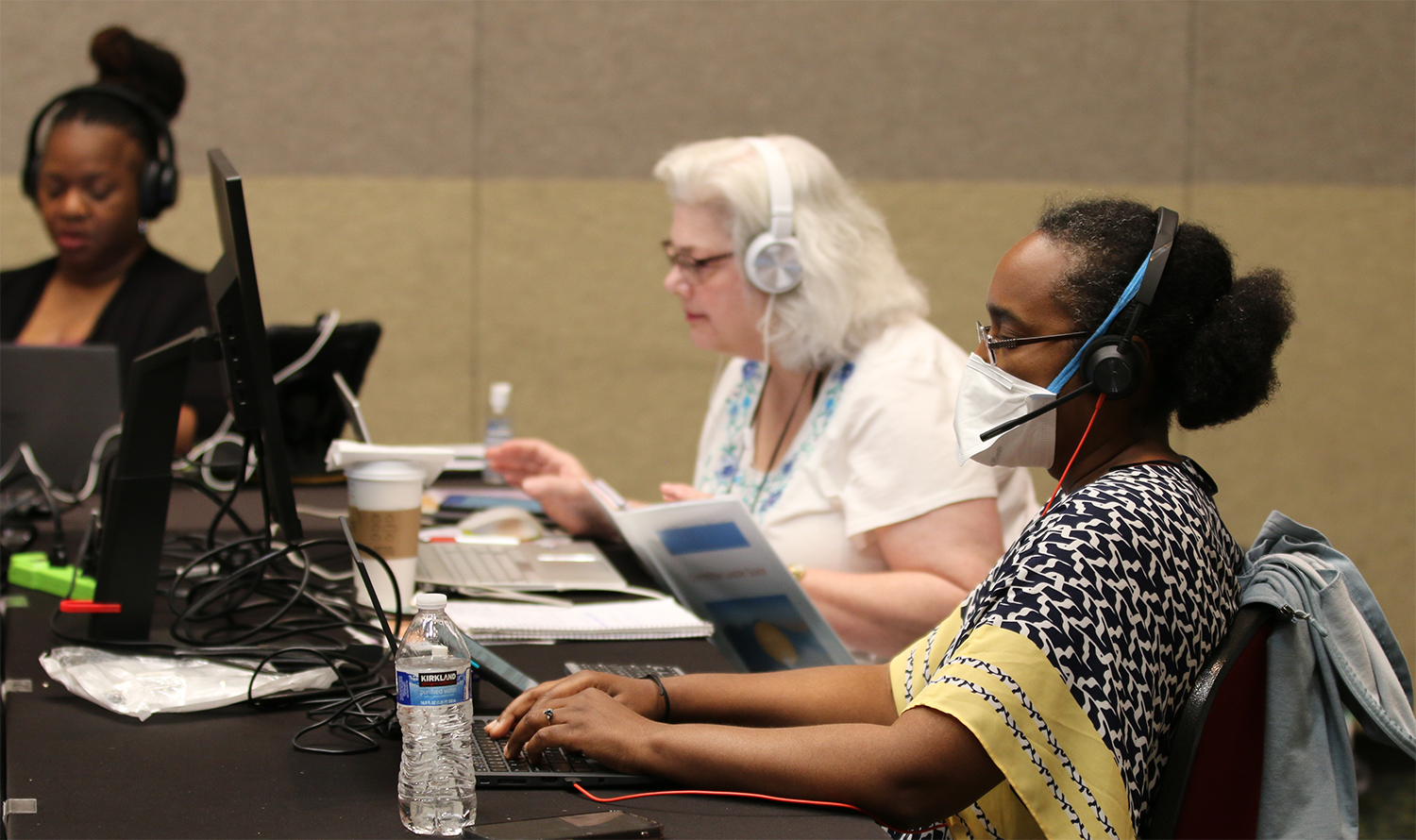
Ordination committee resource coordinator Alicia Demartra-Pressley (front), committee assistant Susan Trigger (middle), and vice-moderator Sonya McAuley-Allen (back) convene the final day of committee meetings on June 27, 2024. Photo by Randy Hobson.
After two long days of rigorous business, the sole remaining items on the Ordination Committee’s schedule for its final online meeting were three overtures, ORD-01, ORD-02 and ORD-03, from Lake Erie Presbytery, all of which call for greater clarity surrounding “shared ministry.”
As in its previous two days’ work, the committee was once again confronted with the changing nature of the denominational landscape and the reality that 76% of PC(USA) churches claim 150 members or less, and only 46% of congregations have installed pastoral leadership.
In introducing that statistic, the Rev. Dr. Douglas Portz, vice president of Church Relations and director of Interagency Relations for the Board of Pensions of the PC(USA), and overture advocate for the three items, painted a somewhat bleak picture of the small-church context that prompted the overtures.
“Many of our churches can’t afford a full-time pastor, with pastors often having to take a second job and seminary graduates finding it impossible to get by being called to a part-time call in a rural or urban setting,” Portz began. “Such pastors, if not supported with a livable wage, look for other employment and benefits. Clarifying the value of shared ministry, validating it and encouraging presbyteries to think creatively to create sustainable calls is what the overtures seek to achieve.”
Because the recommendation from the Advisory Committee on the Constitution (ACC) was to “answer” ORD-01 with an Authoritative Interpretation (AI), several committee members sought clarification on what an AI is and how it functions. As a result, much of the morning was spent with resource people responding to various process questions.
ACC and corresponding member Dr. Rebecca Blair explained that an AI “is an interpretation of the Constitution that carries the authority of the General Assembly and is binding on the councils of the church,” namely sessions, presbyteries, synods and the General Assembly. She added that AIs, which may be found online in the Annotated Book of Order, are both ongoing and temporary, with the most recent AI being binding until removed or superseded by action of the General Assembly.
“AIs do not change what is in the Book of Order or Book of Confessions,” said Blair, “but they serve as the interpretation of the current content that is authorized by the General Assembly to verify or authorize or legitimize terms.”
In the case of the three overtures from Lake Erie, Blair explained that the ACC was recommending an AI because “there is no definition in use for ‘shared ministry’ that could be consistently applied in determining pastoral calls.”
“The AI clarifies the term ‘shared ministry’ to show how it may be made operational and to legitimize its use,” she said.
Although the Board of Pensions had originally recommended that the committee approve the three overtures, which would have amended the Book of Order to permit a minister of Word and Sacrament to be installed as pastor in multiple congregations, Portz said that adopting the AI would have a similar effect.
“After talking with a couple of members of the ACC, I was satisfied that taking this action would not interfere with any shared ministry program the Board of Pensions would put out,” he said in response to a question from Ruling Elder Odet Douglass of Savannah Presbytery, who then moved that ORD-01 be answered by the AI.
Speaking in favor of the motion, Teaching Elder Louden Young of the Presbytery of East Tennessee said that everything that the overture is seeking to accomplish can already be done within the existing polity.
“This would be our way of telling presbyteries, ‘You can do this and should do this if you want to,’” Young said. “That means we don’t need to create new language.”
Yet Teaching Elder Grace Kim of Abingdon Presbytery expressed a different view, as did several other committee members who cited the need to ensure stability — especially full benefits — in shared ministry positions, which are often held by women, people of color or LGBTQ+ people.
“I have been doing part-time work for the past nine years, from two part-time positions to three churches,” Kim said in speaking against the motion, which later passed by a vote of 38–6. “While I understand that recognizing shared ministry may already be in the power of the presbytery, having recognition in the Book of Order will foster the conversation of how we can recognize it as a legitimate ministry.”
Because the committee determined after its exhaustive discussion on ORD-01 that ORD-02 and ORD-03 could also be answered by the AI, motions to answer those two overtures with the action taken on ORD-01 passed.
Teaching Elder Britney Knight of Lake Erie Presbytery observed that over the past couple of days, committee members have realized that ministry is changing.
“We need to be more creative and imaginative, as our vows state,” Knight said, “and what’s already in the Book of Order allows for such creativity. We need to make sure that the AI gets to all of our presbyteries, and that stories of shared ministry are lifted up so we can continue to imagine ways that churches can be served by pastoral leadership in all of its different contexts. We can help presbyteries be creative to create a full-time call for all in ministry.”
